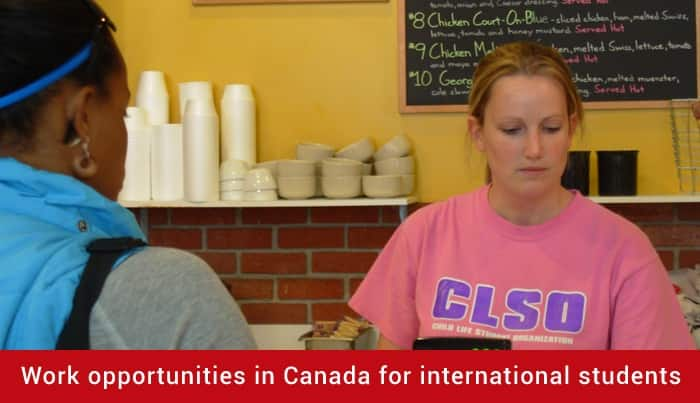Work Opportunities in Canada for International Students
Work Opportunities in Canada -When choosing a destination to study abroad, students prefer to work while studying so that the money they earn will go towards meeting part of their expenses in that country. Canada is favourable to students in this aspect because international students can work while they are studying in Canada. According to the Citizenship and Immigration Canada (CIC), a department of Canadian government, international students in the country may work on campus or off campus or else they can opt to work as a co–op student or intern, if they want to earn while they study. Opportunities in Canada for international students is based on this rule. In fact, the Immigration Refugees and Citizenship Canada (IRCC) had announced in 2022 that the Canadian government will allow international students to work off-campus on their study permit for more than 20 hours per week while their course is in progress. This permission is valid till December 2023. Let us look at opportunities in Canada for for Indian students before and after study in Canada.
This Story also Contains
- Work opportunities in Canada -Eligibility conditions
- Work as a Co–op student or intern
- Advantages of working while studying
- Work after study in Canada

Work opportunities in Canada -Eligibility conditions
International students can work in Canada if they have a study permit that has a condition which allows them to work on or off campus during their course. Working off campus means they can work for any firm outside the university campus during their course while working on campus means that they can work for any employer located on the university or college campus.
Eligibility conditions to work on campus
Your study permit must mention that you are allowed to work on campus in Canada
You must have a valid study permit
You must have a Social Insurance Number (SIN)
Part-time job opportunities in Canada for Indian- On campus
Employers for on-campus work includes:
The university or college as a research assistant.
A faculty member.
A student organisation.
Your own organisation, if you own a business on-campus such as a coffee shop.
A private contractor offering services on campus, such as a restaurant or gym.
Conditions to work off campus
Study permit that allows you to work off-campus
Work off-campus up to 20 hours per week in a regular academic sessions and
Work off-campus full-time during spring break or winter / summer holidays.
Here are some examples of best job opportunities in Canada for off campus:
Companies in their field of study as interns, research assistants or coordinators
Banks as tellers, customer service representatives
Restaurants as servers, hosts, cooks
Stores as customer service representatives, cashiers, designers of store displays, et
Work as a Co–op student or intern
One of the work opportunities in Canada is to work as an co-op student or intern. For some academic programmes, work experience is part of the curriculum. In such a case it becomes easier for international students to explore opportunities in Canada, as the CIC allows foreign students studying such courses to go for a co-op or paid internship programme, for which they will have to apply for both work permit and study permit. A Co-op (Co-operative Education) is a type of internship programme that enables college students to do career training working with professionals in their major fields of study and get paid.
Following are the eligibility criteria for a work permit for Co–op progamme or paid internship:
Students must have a valid study permit.
Their employment must be a part of their academic programme, and should be certified by a letter from the concerned academic official.
The co-op or internship employment should not make more than 50% of the total program of study. International students will not be eligible to work as co–op student or intern if they are studying English or French as a second language. Students will not be eligible if they are studying general interest courses or are studying in courses that are preparing them for another study program. As for internships you need a work permit that is the same as that required for co-op students.
Know more about Canada:
Advantages of working while studying
The advantages of work opportunities in Canada are -
- You will gain valuable work experience that will be of value when starting your career in your home country.
- You will meet new people.
- You will build your network that will help in your job hunt later on.
- You will gain experience that will help you find a job in Canada after your studies and sty back in the country.
- You can offset some of the expenses that you incur while studying in Canada.
- You will get some degree of financial independence.
- You will acquire skills such as time management, team work, communication skills etc.
Related reading
Work after study in Canada
As there are many work opportunities in Canada, students even prefer to work in Canada after completing their studies. For work after study in Canada, the candidate can apply for Post Graduate Work Permit (PGWP) which allows the students to stay and work temporarily in Canada. The candidate can apply for PGWP before the expiration of Student Visa Canada.
Few of the best job opportunities in Canada for Indian students are -
- Doctor
- Hospital administration staff
- Nursing
- Web Developer
- Electrical Engineer
- Business Admistrator
- Hospitality and Tourism
- Indian Cuisine Cook
- IT Support
- Marketing Management
Applications for Admissions are open.
Want to study in Ireland? Explore Universities & Courses
Study in Canada
ApplyExplore Universities, Courses & Subjects | Work while study
Study in UK
ApplyApply for upcoming intake & plan your journey
Study in USA
ApplyUniversities inviting applications | Get expert guidance
Study in Australia
ApplyShortlist best ranked universities & get expert guidance